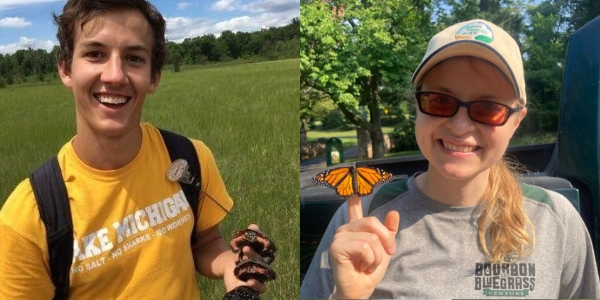Ensuring a beautiful world for generations to come
Jenna Walters (she/her) is a fifth-year Ph.D. candidate in Dr. Rufus Isaacs’ lab and earning a dual degree in the Department of Entomology and the Ecology, Evolution, and Behavior. Program Walters received her B.S. degree from MSU in 2019, majoring in integrative biology/zoology and a minor in entomology. Her research is focused on understanding the consequences of extreme heat on native bee pollinators and blueberry pollination systems. Walters is presenting her research at the April 12 MSU Board of Trustees meeting.

Growing up in Michigan, I have always been fascinated by nature, from the vast Great Lakes and dense forests to colorful wildflower fields and sweet berry patches. I spent most of my childhood outside, and in many ways was oblivious to how fortunate I was to learn and play in these increasingly threatened ecosystems. As a teenager, I saw changes in these once familiar spaces and felt a deep obligation to protect them, leading me to join Michigan State University in 2015 to study biological sciences.
As a student researcher in an entomology lab, I quickly learned how incredible insects
are. There is a greater diversity of insects than anything else in the world, yet
we know so little about them. These often-overlooked critters are central to ecosystem
functioning, particularly bees and their mutualistic relationship with flowering plants.
In fact, 75% of the world’s crops require animals, primarily bees, to help produce
the food we rely on. However, populations of some native bee species are in decline,
with consequences for agricultural production and the resilience of natural ecosystems.The spring before my senior year as an undergraduate student, Michigan experienced
a heatwave during blueberry bloom. It was the hottest May in the past 92 years, even
hotter than the dust bowl. That same year, blueberry growers reported 30-50% yield
declines, costing the industry millions of dollars, and limiting fresh, local produce
to consumers. It was unclear whether yields were reduced because of the heat or due
to poor pollination by bees, and as a new student in Dr. Rufus Isaacs lab, I was excited
at the possibility of helping figure this out. Before I knew it, this undergraduate
project developed into the focus of my PhD program.
So far, my research has found that blueberry pollen exposed to extreme heat (>90°F)
even for just 4 hours can kill pollen, potentially limiting fruit production. Our
research is the first to report temperature thresholds for this crop and is already
guiding decisions of blueberry producers across the country. However, I am also interested
in how heat has this effect. Drawing on different disciplines, including plant physiology
and biochemistry, the leading hypothesis is that developing pollen exposed to heat
lacks certain nutrients that fuel fertilization. These nutrients including proteins,
carbohydrates, lipids, and amino acids also the primary food resource for bees. While
no one had studied this before, I predicted that if extreme heat effects the quality
of pollen, this may also have adverse effects on bees.
To explore this, I developed a cage experiment to provide a native solitary bee, the
blue orchard bee, with heat-stressed blooming blueberry plants. We recorded a 70%
reduction in egg laying by mother bees provided heat-stressed blueberry bushes, compared
to normal plants, and of the offspring produced by these bees, 60% died before ever
reaching adulthood. These findings shed light on the cascading and cumulative effects
of extreme heat on plants, bees, and their interactions with potential implications
for bee population declines, food availability, and the cost of fresh food.
Understanding how extreme heat affects our crops and their pollinators is an important
first step, but there is much work to be done. Having the opportunity to share my
research with farmers, the public and the Board of Trustees, helps to bring attention
to this issue. It takes people from a diversity of backgrounds to create and implement
solutions to combat climate change, save the bees and ensure a beautiful world for
generations to come.
Read the full story in MSU Today.



